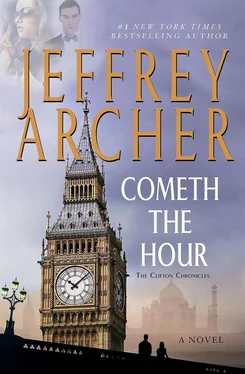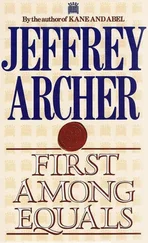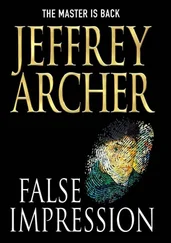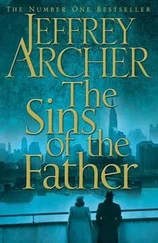A small round of applause emanated from the bedroom.
“Not bad, George. If I was on the jury, I’d certainly be convinced.”
“Though I’m not sure I am,” said Carman quietly, as he pulled the plug.
Gilly Gray didn’t speak to his wife over breakfast. He was not a moody man, but Susan had become used to longer and longer silences whenever a trial was drawing to a close, so she didn’t comment when he left the table and retreated to his study to prepare his closing remarks to the jury. When the phone rang in the hall, Susan rushed to answer it so he wouldn’t be disturbed.
“Members of the jury, is it credible that a man of Mr. Bishara’s standing could be involved in such a squalid crime? Would someone who had so much to lose entertain for a moment—”
There was a tap at the door. Gilly swung round, knowing that his wife would not have considered interrupting him unless...
“There’s a Mr. Barry Hammond on the line. He says it’s urgent.”
For Hakim Bishara, it was not a long weekend, but sixty-seven sleepless hours while he waited to be driven back to the court to learn his fate. He could only hope that when the foreman of the jury rose, he would deliver two words, not one.
While he was pacing around the prison yard on Sunday afternoon, accompanied by two bankers who would find it difficult ever to open an account again, several inmates came over to wish him luck.
“Pity one or two of them didn’t appear as witnesses in the trial,” said one of his companions.
“How would that have helped?” asked Hakim.
“Rumor on the block is that the drug barons are telling everyone you were never a dealer or a junkie, because they know their customers and suppliers better than any retailer. After all, they can’t advertise, and they don’t have a shop front.”
“But who would believe them?” asked Hakim.
Sebastian arrived at the Old Bailey just after nine thirty on Monday morning. When he entered the court, he was surprised to find Arnold Hardcastle sitting alone on the defense counsel’s bench. Seb glanced across to see that Mr. Carman was already in his place, checking through his closing address. He looked as if he couldn’t wait for the starting pistol to fire so he could burst out of the blocks and head for the tape. There are no silver medals for barristers.
“Any sign of our esteemed leader?” asked Seb as he sat down next to Arnold.
“No, but he should be with us at any moment,” said Arnold, checking his watch. “When I rang earlier, his junior told me he wasn’t to be disturbed under any circumstances. Though I must say, he’s cutting it fine.”
Seb kept looking toward the doorway, through which court officials, lawyers, journalists and other interested parties were streaming, but Mr. Gray was not among them. 9:45 a.m., and still there was no sign of him. 9:50, and Mr. Carman began casting the occasional quizzical glance in their direction. 9:55, and Arnold was becoming quite anxious, as the judge would be certain to ask him where defense counsel was, and he didn’t know. 10:00.
Mr. Justice Urquhart entered, bowed to the court and took his seat on the raised dais. He checked that the defendant was standing in the dock and waited for the twelve jurors to be seated in the jury box. Finally, he looked down at leading counsel’s bench to see Mr. Carman sitting on the edge of his seat, impatient for proceedings to begin. The judge would have obliged him but he couldn’t see any sign of the defense counsel.
“I would call you, Mr. Carman, to deliver your closing address, but it appears that Mr. Gray is not among us.”
No sooner had Mr. Justice Urquhart uttered these words than the door on the far side of the courtroom was flung open and Gilbert Gray came charging in, gown flowing behind him as he readjusted his wig on the move. Once he had settled, the judge said, “Good morning, Mr. Gray. Do you have any objection to my calling Mr. Carman to present his closing address?” He made no attempt to hide his sarcasm.
“I do apologize, my lord, but I would beg your indulgence and ask if I can call a witness who has fresh evidence to present to the court.”
Mr. Carman sat down and closed his file with a thud. He leaned back and waited to find out who this witness could possibly be.
“And who is this new witness, might I ask, Mr. Gray?”
“I shall not be calling a new witness, my lord, but recalling Mr. Collier to the stand.”
This request clearly took everyone by surprise, including Mr. Carman, and it was some time before the chattering subsided enough to allow the judge to ask his next question. He leaned forward, peered down at the Crown’s silk and said, “Do you have any objection, Mr. Carman, to Mr. Collier being recalled at this late juncture?”
Carman wanted to say yes I most certainly do, my lord, but he wasn’t sure on what grounds he could possibly object to the Crown’s principal witness giving further testimony. “I have no objection, my lord, although I am curious to know what fresh evidence can have arisen over the weekend.”
“Let’s find out, shall we?” said the judge. He nodded to the clerk.
“Call Mr. David Collier!”
The senior customs officer entered the room and returned to the witness box. Nothing could be gleaned from the expression on his face. The judge reminded him that he was still under oath.
“Good morning, Mr. Collier,” said Gray. “Can I confirm that you appear on this occasion at your own request and not as a witness for the prosecution?”
Sebastian couldn’t help noticing that Mr. Gray had put aside his earlier adversarial manner with this witness in favor of a more conciliatory tone.
“That is correct, sir.”
“And why do you wish to reappear?”
“I feared that if I didn’t, a grave injustice might be done.”
Once again, loud chattering broke out in the court. Mr. Gray made no attempt to continue until silence prevailed.
“Perhaps you would care to elaborate, Mr. Collier.”
“On Friday evening I had a call from a senior colleague in Frankfurt to brief me on a recent case in that city, which he felt I should know about. In the course of that conversation I discovered the reason Mrs. Aisha Obgabo, the stewardess on flight 207, had only been able to present written evidence to this court.”
“And what was the reason?” asked Mr. Gray.
“She’s in jail, serving a six-year sentence for a Class A drug offense.”
This time the judge made no attempt to quell the outburst of chattering caused by Collier’s revelation.
“And why should that have any bearing on this case?” asked Mr. Gray, once order had been restored.
“It seems that a few weeks after Bishara’s arrest, Mrs. Obgabo was arrested for being in possession of two ounces of marijuana.”
“Is marijuana considered a Class A drug in Germany?” asked the judge incredulously.
“No, my lord. For that offense, the judge gave Mrs. Obgabo a six-month suspended sentence and ordered that she be deported back to Nigeria.”
“Then why wasn’t she?” demanded the judge.
“Because during the trial it came to light that Mrs. Obgabo had been having an affair with the captain of the aircraft on which she was a stewardess. If she had been sent back to Nigeria, my lord, she would have been arrested for adultery and, if found guilty, the punishment in that country is death by stoning. So at the end of the trial, when the judge asked her if she wished for any other offenses to be taken into consideration before he passed sentence, she admitted to being paid a large sum of money to place thirteen ounces of heroin in the bag of a first-class passenger on a Nigeria Airways flight from Lagos to London. Mrs. Obgabo couldn’t recall the name of the passenger, but she did remember that the bag she placed the heroin in was embossed in gold with the initials HB. For this offense, the judge sentenced Mrs. Obgabo to six years in prison, which her lawyer assured her was more than enough time for her to apply for asylum as a political refugee.”
Читать дальше












